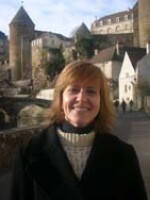SCOTT SIMON, HOST:
This is WEEKEND EDITION from NPR News. I'm Scott Simon. There are thousands of people - men, women and children - exhausted and hungry from theaters of war, walking over roads in Europe this weekend. Thousands of refugees from Syria, Iraq and other places have been streaming into Europe for months. After a week of refusing to let them board trains in Hungary to continue their journey, authorities briefly reversed course last night and chartered hundreds of buses to transport refugees to the Austrian border. But this morning, Hungarian authorities said they would no longer provide those buses. Thousands of migrants have been walking to the border. NPR's Eleanor Beardsley witnessed the migrant march last night and sent this report.
ELEANOR BEARDSLEY, BYLINE: Hello.
UNIDENTIFIED MAN #1: Hello, how are you?
BEARDSLEY: How are you, are you tired?
UNIDENTIFIED MAN #1: I am so tired, but we are feeling freer. We will go.
BEARDSLEY: The stream of humanity arrived along the highway about 18 miles out of Budapest at dusk on Friday. They'd been walking most of the day. Hundreds, like 17-year-old Syrian Shadi Rhamoun, had been camped out at Budapest's main train station for days, where all trains westward had been canceled. He says people just couldn't take it any longer.
SHADI RHAMOUN: The Hungary police won't let us leave his country.
BEARDSLEY: And so everyone decided at once, we go?
RHAMOUN: That's it. We talk each other - we said we will go walking, because we have no choice.
BEARDSLEY: The Austrian border is a hundred miles away, but no one seems daunted by that.
It's amazing. At the train station, people seemed beaten down and desperate, and here, they're all smiling, despite the fact that they're walking.
There are hundreds of families with small children and babies. A young man pushes an old man in a wheelchair. And there's 20-year-old Khaled Ahmed who has a prosthetic leg up to his hip.
UNIDENTIFIED MAN #2: This is a plastic leg. A plastic leg.
BEARDSLEY: Khaled is perched on a bike pushed by one friend. Another carries his crutches.
KHALED AHMED: I'm from Syria.
BEARDSLEY: What happened to your leg?
AHMED: Bomb in my house.
BEARDSLEY: At a rest stop along the highway, scores of Hungarian citizens come out to help. They give out food, blankets and baby strollers. Susan Molnar says her government's harsh treatment of the migrants compelled her to come.
SUSAN MOLNAR: I think that this is the normal human right (laughter), to receive this and to have. And I am shamed - I'm shamed - all the press is full with those pictures about Hungary. But the Hungarian people, they do like me.
BEARDSLEY: Hungarian police cars zoomed up and down the highway, but authorities did not try to stop the marching migrants, even though all week police blocked them from moving freely and tried to herd them into camps. The refugees want to move to countries in Western Europe, particularly Germany, where they say job and asylum prospects are better. European leaders are struggling and divided over a solution to the crisis. Hungarian Prime Minister Viktor Orban called the migrants a threat to Europe's Christian identity, but Chancellor Angela Merkel said Germany would accept all Syrians who could make it there.
UNIDENTIFIED MAN #3: (Foreign language spoken).
BEARDSLEY: Back on the highway, the migrants rest in the grass for a brief moment before a group leader urges them to keep moving. An exhausted looking man with a baby strapped to his chest begins to get back on his feet.
UNIDENTIFIED WOMAN: Why don't you rest here now?
BEARDSLEY: One Hungarian woman tries to convince the migrants to stay for the night, to no avail. But before they move on, she takes off her own tennis shoes...
UNIDENTIFIED WOMAN: They are very warm (laughter), but very comfortable.
BEARDSLEY: And puts them on the feet of a woman who is walking in flip-flops. Eleanor Beardsley, NPR News, on the Budapest-Vienna highway. Transcript provided by NPR, Copyright NPR.



